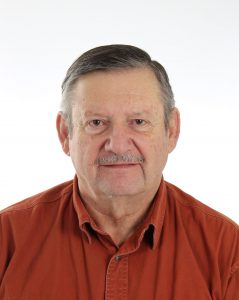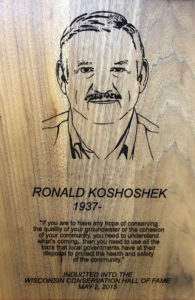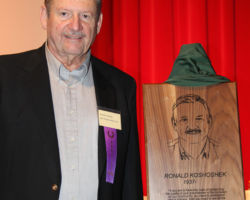1937 –
Inducted 2015
“If you are to have any hope of conserving the quality of your groundwater or the cohesion of your community you need to understand what’s coming and then you need to use all the tools that local governments have at their disposal to protect the health and safety of the community” — Ron Koshoshek
Born in Eau Claire, where he spent many hours learning to fish the area’s streams and creeks, Ron Koshoshek received his Masters from Fordham University in New York in 1962 and his PhD in 1966. In 1969, he secured a position at the University of Wisconsin-Eau Claire teaching Philosophy, Ethics and Jurisprudence where he continued teaching until he retired as Professor Emeritus in 1999.
Motivated first by the evidence of environmental degradation encountered in the streams and rivers that he fished, the professor began to develop what was to become a parallel career in conservation. Concerned with the decline in area streams, Ron founded the Ojibleau Chapter of Trout Unlimited in 1972 to begin educating riparian landowners, and to give voice to the waters and fish that had none. Under his leadership, the group (later renamed the Clear Water Chapter of Trout Unlimited) began working on a habitat restoration of McCann Creek.
Clearly there was no future in stream restoration if the state continued to ignore the damage done by unchecked erosion at road construction, logging and mining sites. Recognizing this, in 1976 Ron recruited a group of citizens to co-sign a petition for a contested case hearing, which was ruled in favor of the petitioners. Henceforth, he said, all counties and towns would be required to get a permit from the WDNR before starting construction of a project that crossed a public waterway.
Subsequently the permit requirement was superseded, after a long fight, by a bill requiring a handbook of best practices for erosion control during road construction. The bill was signed into law in 1978. A year later this same approach was adopted by Minnesota as well. This erosion control case in Marathon County set the pattern Koshoshek would follow in succeeding cases, both as a citizen advocate and as a public servant – assist a group of concerned citizens, advise them well on relevant laws and science, and assist them to bring the force of law to the problem, or more frequently, to find satisfactory compromise outside of legal action.
Another case was the Lowes Creek agreement which was signed in August of 1983 between the City of Eau Claire, Town of Washington, Lowes Creek Watershed Protection Association, WI Public Intervenor and Trout Unlimited, Inc. The agreement provided a framework for allowing development in an environmentally sound manner.
Later as Chair of the Citizens Advisory Committee, Ron was instrumental in helping the Town of Casey develop and defend an ordinance designed to put controls on the New Inductees application of pesticides in the Township. As a result cities and towns across the country are now able to regulate pesticide use within their jurisdictions based on local concerns and considerations. Ron was central to the development of the Wisconsin Towns Association’s on-line package of ‘tools’ that towns across the state could use to develop licensing ordinances.
Recognizing the threat to air quality of crystalline silica dust produced by frac sand mining, Ron undertook to initiate a citizen petition requesting the WDNR to promulgate rules to regulate crystalline silica emissions. The silica dust petition, submitted in November 2011, failed to move the WDNR, however, it provides a 35 page roadmap for future action. Once again, Ron is at the helm of a path breaking initiative. This is the first step in what promises to be a long process of citizen activism that will face regulatory hurdles, technical challenges, and a reexamination of the application of the Public Trust Doctrine itself.
Resources
Photos
These images may be used under the Creative Commons Attribution-NonCommercial-NoDerivatives 4.0 International License.




